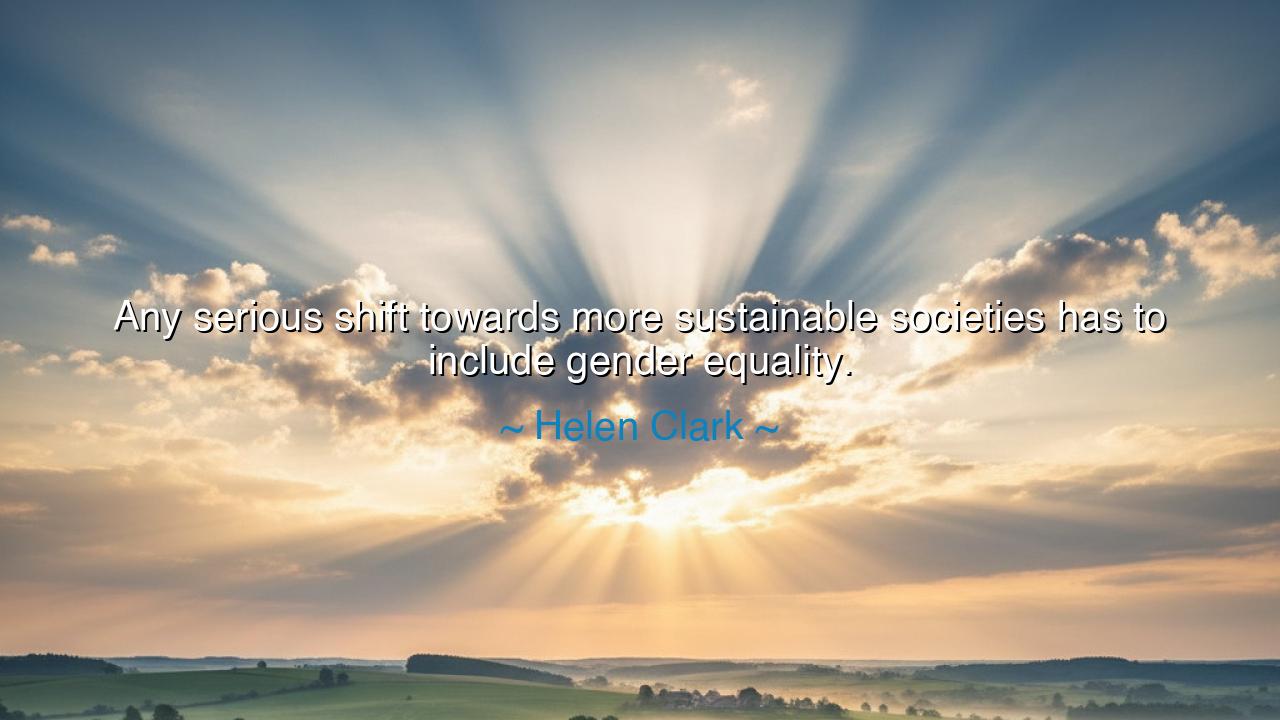
Any serious shift towards more sustainable societies has to






The words of Helen Clark — “Any serious shift towards more sustainable societies has to include gender equality.” — are like a steady flame in a darkened hall, revealing what many have long ignored: that no civilization can endure if half of its people are restrained, silenced, or denied their rightful place in shaping the future. In this declaration, the former Prime Minister of New Zealand and long-serving leader at the United Nations Development Programme speaks not as a politician seeking applause, but as a guardian of truth. She reminds humanity that sustainability — the art of building a world that endures beyond one’s own lifetime — depends not only on care for the earth or the economy, but also on the balance of justice between men and women. For where inequality festers, progress withers, and where equality thrives, the roots of peace and prosperity run deep.
Helen Clark has spent her life in the service of global development and human dignity. Her words arise not from theory, but from decades of witnessing the struggles of nations to rise from poverty and conflict. She has seen, again and again, that no society can sustain itself when it silences the voices of its women — for they are the bearers of life, the stewards of community, the architects of compassion, and the unseen laborers upon whose backs entire economies rest. Her message, spoken in halls of power and echoed in villages alike, is that the dream of sustainability — of balance between humanity and nature, between wealth and justice — cannot be realized until gender equality becomes not an aspiration, but a lived reality.
The meaning of her words runs deeper than policy or politics. When Clark speaks of a “serious shift,” she is calling for more than reform — she is calling for transformation. A sustainable society is one that endures not through domination, but through cooperation; not through greed, but through harmony. Such balance cannot exist while women are denied education, while their work is undervalued, while their safety is insecure, and while their wisdom is ignored. To exclude women from decision-making is to silence half the world’s wisdom — to cripple the very spirit of human advancement. Equality, then, is not charity, but necessity — the key that unlocks the full potential of humanity.
The ancients themselves understood this truth, though they often forgot to live by it. In the myth of Isis and Osiris of Egypt, the goddess Isis restores her slain husband to life — a symbol of the divine power of the feminine to heal and renew the world. In the East, the teachings of Confucius spoke of balance — the harmony of yin and yang, masculine and feminine, strength and gentleness. Civilization, they knew, could not stand on one leg; it required the dual pillars of male and female working in concert. Yet time and pride led many societies to forget this balance, raising monuments to the deeds of men while neglecting the wisdom of women. It is this imbalance that Helen Clark calls upon humanity to correct — not as a matter of justice alone, but as a matter of survival.
Consider the story of Wangari Maathai, the Kenyan environmentalist and Nobel Peace Prize laureate. She began by planting trees — one seed, one sapling, one act of care — and in doing so, she awakened a nation. But her vision was not of trees alone; it was of people, especially women, reclaiming their power to heal both the land and themselves. Through her Green Belt Movement, millions of trees were planted, and with them grew a movement for democracy, for education, and for equality. Wangari proved the truth of Clark’s words: that sustainability and gender equality are one and the same root, for when women rise, so does the earth itself.
The lesson of Helen Clark’s wisdom is clear: if we wish to build a world that lasts, we must build it together. Sustainability cannot exist where inequality reigns, for oppression consumes what it touches. To exclude women from leadership, from education, from opportunity, is to build a house upon one half of its foundation — doomed to collapse under its own imbalance. True sustainability demands not only green energy and wise economies, but also equal voices and shared power. The future will not belong to those who dominate, but to those who cooperate — who understand that the strength of humanity lies in the union of its halves.
So, my children, take this truth into your hearts: do not seek balance in nature while denying balance in human life. Let every home, every community, every nation honor the equality of men and women as the cornerstone of endurance. Raise your daughters not to bow, but to build; teach your sons not to rule, but to respect. Remember always that the earth herself is a mother — patient, giving, and fierce in her justice. When you honor the feminine, you honor life itself.
Thus, the wisdom of Helen Clark endures as a call to all generations: a sustainable society is a just society, and a just society is one where every voice, every hand, every heart — male and female alike — works in harmony for the good of all. When humanity learns to walk in equality, it will finally walk in peace.






AAdministratorAdministrator
Welcome, honored guests. Please leave a comment, we will respond soon